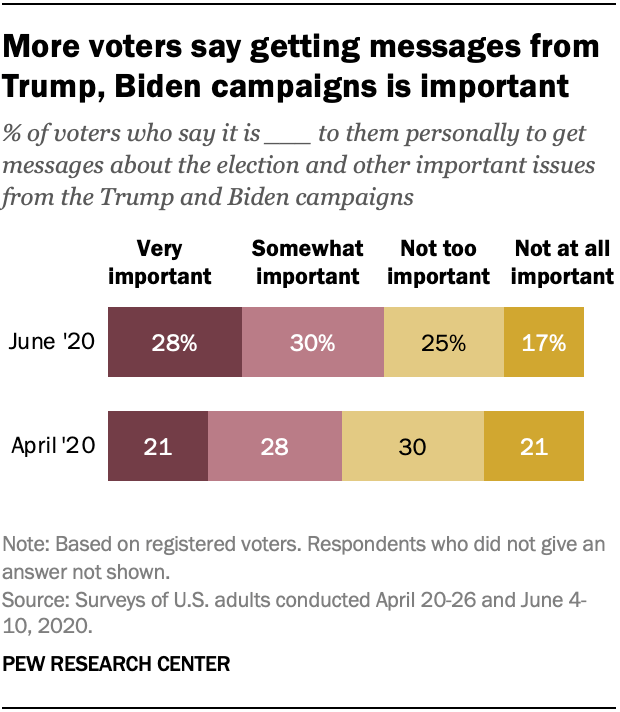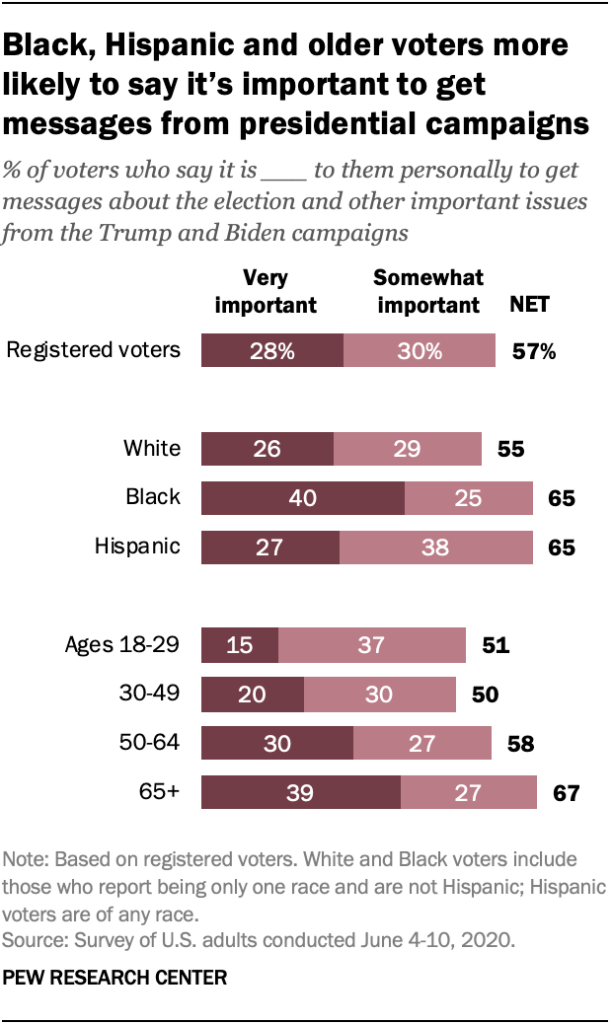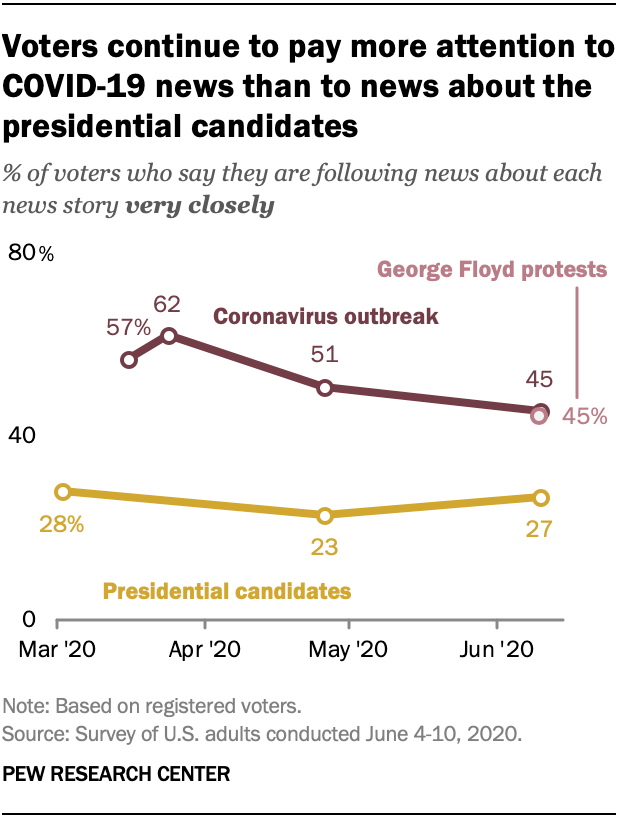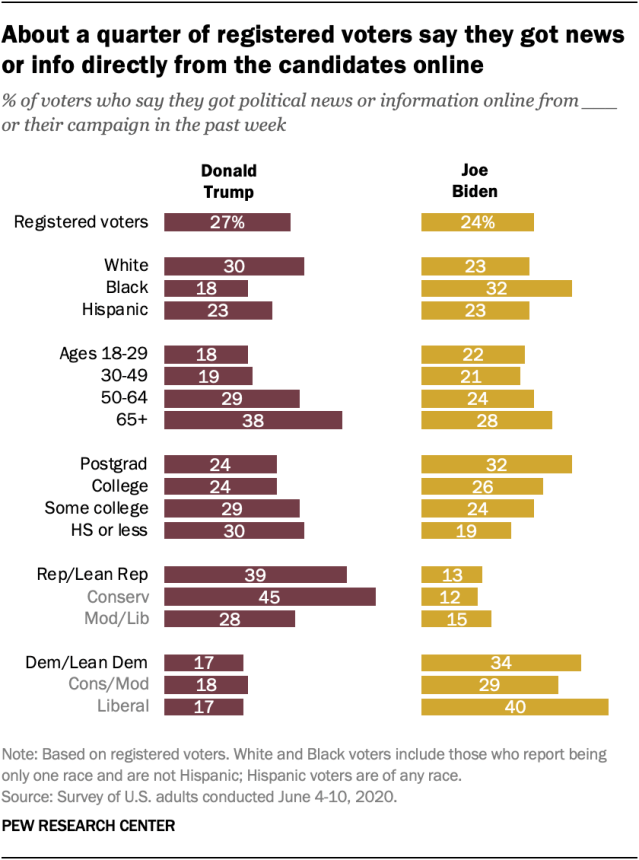A growing share of registered voters say it is personally important to them to get messages about the presidential election and other important issues from the Donald Trump and Joe Biden campaigns, according to a Pew Research Center survey conducted in early June as part of the American News Pathways project. The increase comes even as the coronavirus outbreak and protests over the killing of George Floyd have dominated the public’s attention in recent months.
In the June 4-10 survey, a majority of voters said it is very (28%) or somewhat important (30%) to them personally to get messages from the presidential campaigns about important issues. About four-in-ten said it is not too important (25%) or not at all important (17%).
The share of voters saying it is very or somewhat important to get messages from the Trump and Biden campaigns increased 9 percentage points between late April and early June. Much of this increase resulted from more voters saying it is very important to them: As of June, 28% said it is very important to get these messages, up from 21% in April.
To explore voters’ interest in getting news and information from the Trump and Biden campaigns as well as their engagement with 2020 news, we surveyed 9,654 U.S. adults from June 4 to 10, 2020, as part of the American News Pathways project. To shed light on the U.S. electorate’s attitudes about the upcoming presidential election, this analysis focuses on those who said in a previous survey that they are U.S. citizens who are definitely registered to vote.
Everyone who took part is a member of Pew Research Center’s American Trends Panel (ATP), an online survey panel that is recruited through national, random sampling of residential addresses. This way nearly all U.S. adults have a chance of selection. The survey is weighted to be representative of the U.S. adult population by gender, race, ethnicity, partisan affiliation, education and other categories. Read more about the ATP’s methodology. You can find the data from this analysis for all U.S. adults in this interactive tool.
Here are the questions used for the report, along with responses, and its methodology.
Black and Hispanic voters, as well as those ages 65 and older, express more interest than others in getting messages from the presidential campaigns.
About two-thirds of Black (65%) and Hispanic voters (65%) said it is at least somewhat important to them to hear from the Trump and Biden campaigns. Among white voters, 55% said this.
Four-in-ten Black voters said it is very important to hear directly from the campaigns, compared with 27% of Hispanic and 26% of white voters.
Differences also emerge by age. About four-in-ten voters ages 65 and older (39%) said it is very important to them to hear from the presidential campaigns, compared with 30% of those 50 to 64, 20% of those 30 to 49 and just 15% of those ages 18 to 29. Slightly more 18- to 29-year-old voters (37%) said it is somewhat important to them, compared with roughly three-in-ten saying the same in the other age groups.
Between April and June, interest in hearing messages from the campaigns went up in every racial, ethnic and age group analyzed here.
Voters are still paying far less attention to the election than to COVID-19, George Floyd protests
While the public’s interest in hearing from the presidential campaigns has increased, voters have been paying far less attention to news about the presidential candidates than to news about the COVID-19 pandemic and the protests over George Floyd’s killing.
In the early June survey, overwhelming majorities of voters said they were paying attention to news about the coronavirus outbreak and Floyd protests at least fairly closely (90% and 86%, respectively), including 45% of voters who said they were following these stories very closely.
By comparison, attention to news about the 2020 presidential candidates was much more modest. While a majority of voters said they were paying very or fairly close attention (63%), only 27% said they were paying very close attention. More than a third of voters (36%) said they were following election news either not too closely or not at all.
Who is getting news and information from the candidates online?
About a quarter of registered voters said in June that they got news or information online – such as through email, social media or a campaign website – directly from either Trump or Biden. Just 27% of voters said they had gotten online political and election news or information directly from Trump or his campaign in the prior week, while 72% said they had not. About a quarter of voters (24%) said they had gotten information online from Biden or his campaign, while three-quarters (75%) said they had not.
White voters were more likely than Black or Hispanic voters to say they had gotten political news from Trump and his campaign in the past week. Three-in-ten white voters said this, compared with 23% of Hispanic and 18% of Black voters. On the other hand, Black voters (32%) were more likely than white or Hispanic voters (23% each) to say they’d gotten news from Biden or his campaign in the past week.
Younger voters were less likely than older ones to say they had gotten online news or information from Trump or his campaign in the past week. Around one-in-five voters under the age of 50 (19%) said this, compared with 29% of older voters ages 50 to 64 and 38% of those ages 65 and older.
There were no major age differences when it came to the share of voters who had recently gotten online news from Biden or his campaign.
Voters without a college degree were somewhat more likely than those with a college degree or more education to say they had recently gotten news from Trump or his campaign. The education gap was wider for the Biden campaign: About a third of voters with a postgraduate degree (32%) said in June they had gotten online news or information from Biden in the past week, compared with about a quarter or fewer of those with a college degree (26%), some college but no degree (24%) or a high school diploma or less (19%).
Not surprisingly, partisans were most likely to receive online news from their own party’s presidential candidate. About four-in-ten Republicans and Republican-leaning independents (39%) said they had recently gotten news from Trump, compared with 17% of Democrats and Democratic leaners. Conversely, about a third of Democrats (34%) said they had gotten news from Biden, versus 13% of Republicans.
Within each party, ideologically aligned partisans are more likely to get news and information online from their respective candidates. A larger share of conservative Republicans (45%) than moderate or liberal Republicans (28%) said they had recently gotten news from Trump. And liberal Democrats were more likely than conservative or moderate Democrats to hear from Biden online (40% vs. 29%).
Note: You can find the data from this analysis for all U.S. adults in this interactive tool. Here are the questions used for the report, along with responses, and its methodology.







